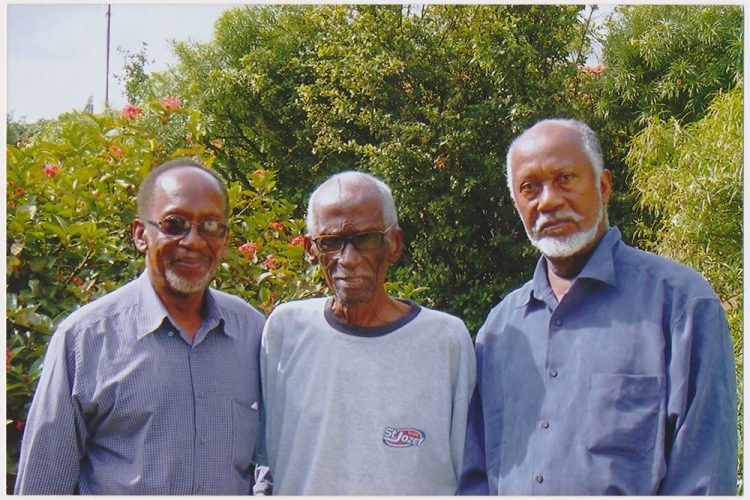Oscar’s vision far exceeded his time

Oscar Allen, the ninth child of Mr and Mrs George Newton Allen, was born at Colonarie, St Vincent and the Grenadines on June 1, 1942. He received part of his early childhood education at the Colonarie Roman Catholic School. In the early 1950s, Oscar Allen moved to Kingstown where he continued his primary school education at the Kingstown Methodist School.
In, 1954, he entered the Boys Grammar School, only to be greeted with the nickname âLittle Turk.â It is while at the Boys Grammar School that Oscar developed an attraction to languages â Latin and, particularly, French, not knowing that 10 or so years later, this would prove to be a most valuable asset in his pastoral work with the peasants in Petit Goave during his priestly role in the Republic of Haiti.
Having lost his parents at an early age, Oscar Allen, being the youngest of the children, quickly developed an independence of his own that would shape the rest of his academic, socio-political, economic, cultural and religious life; in fact, his whole persona. But while this is true, the bonding with his immediate siblings, especially his sisters, would impact his worldview.
After leaving school, Oscar Allen had a short stint with the Ministry of Agriculture, following which he returned to his alma mater in the mid 1960s, where he taught, among other things, the languages.
In 1967, Oscar left St Vincent and the Grenadines for Jamaica, to be trained at the United Theological College of the West Indies (UTCWI) for the Methodist ministry. Confronted by the economic conditions in Jamaica at the time and influenced by his earlier independent thought and way of life, Oscar understood and practised sustainable development at its best and cheapest. He made his own shoes and clothing â a combination of âshirt-jacksâ and dashikis.
In many ways Oscar Allen transcended his time and space. He was misunderstood by the status quo, not only in his thinking, but also in his deportment, the chief among them being his beloved Methodist Church.
It is perhaps his assignment in the Republic of Haiti that has shaped, and one might say provoked him towards a socialist orientation, which permeated his whole being. To him, the paradoxical question must have been, how is it at all possible for the first black liberated people outside of the African continent to be a source of sorrow and joy at the same time?
The truth is, Oscar had been challenged from early by the biblical injunction in the Gospel of Luke chapter 4:18-19, âThe spirit of the Lord, is on me, because he has anointed me to preach good news to the poor. He has sent me to proclaim freedom for the prisoners and recovery of sight for the blind, to release the oppressed, to proclaim the year of the Lordâs favor.â It is this, coined in the eyes of the Liberation theologian that inspired him to not only talk about poverty, the poor, and the disenfranchised, but to work among them in order to assist them in their own liberation.
Oscarâs experience of the Church before and during UTCWI and the Church as a true agent of social change and liberation of the people collided after his return from Haiti. Thus, if he was going to be faithful to his call and conscience to serve the dispossessed of our region, it was soon clear to him that he could not do it within the narrow confines of the institutional church. Hence his decision to leave UTCWI.
After leaving theological college, Oscar devoted his time, talents and intellectual abilities to building relationships and structures through community mobilization, training, action and reflection in the region and in particular, St Vincent and the Grenadines, with the aim of enhancing the creative leadership potential of our peoples as a basis for their development. He was the pioneer of several grass roots organizations, including the National Farmers Union, Arwe, Caripeda, the Walter Rodney Centre, and Projects Promotion Limited, whose roles, though varied, focused on and championed the cause of the working class and the oppressed.
As a political organizer, Oscar Allen conducted small group meetings at his home and elsewhere in Diamonds Village to strategize on important matters. Political education formed part of his daily agenda. But it is his journeys from Diamonds Village to Greiggs, Colonarie, Park Hill and surrounding communities to motivate and challenge working class people toward action and reflection that had lasting impressions on the masses.
His ascendancy to the leadership of the United Peopleâs Movement after the general elections of 1979 is testimony of his commitment not only to that organization, but also to the people whose lives its antecedents shaped and changed.
God gives us, in every generation and time, sons and daughters â politicians, preachers, teachers, and sports men and women, who have, in their own amazing ways, stunned the world. But, it is a rarity in any single generation that God gives to humanity a son or a daughter whose life and vocation transcend its own purpose and time.
Oscar Allen was such a person, whose vision far exceeded its time. He died on Friday, July 28, at the Milton Cato Memorial Hospital, one week after undergoing surgery.
(Adapted from a citation done by Ronnie Daniel)









